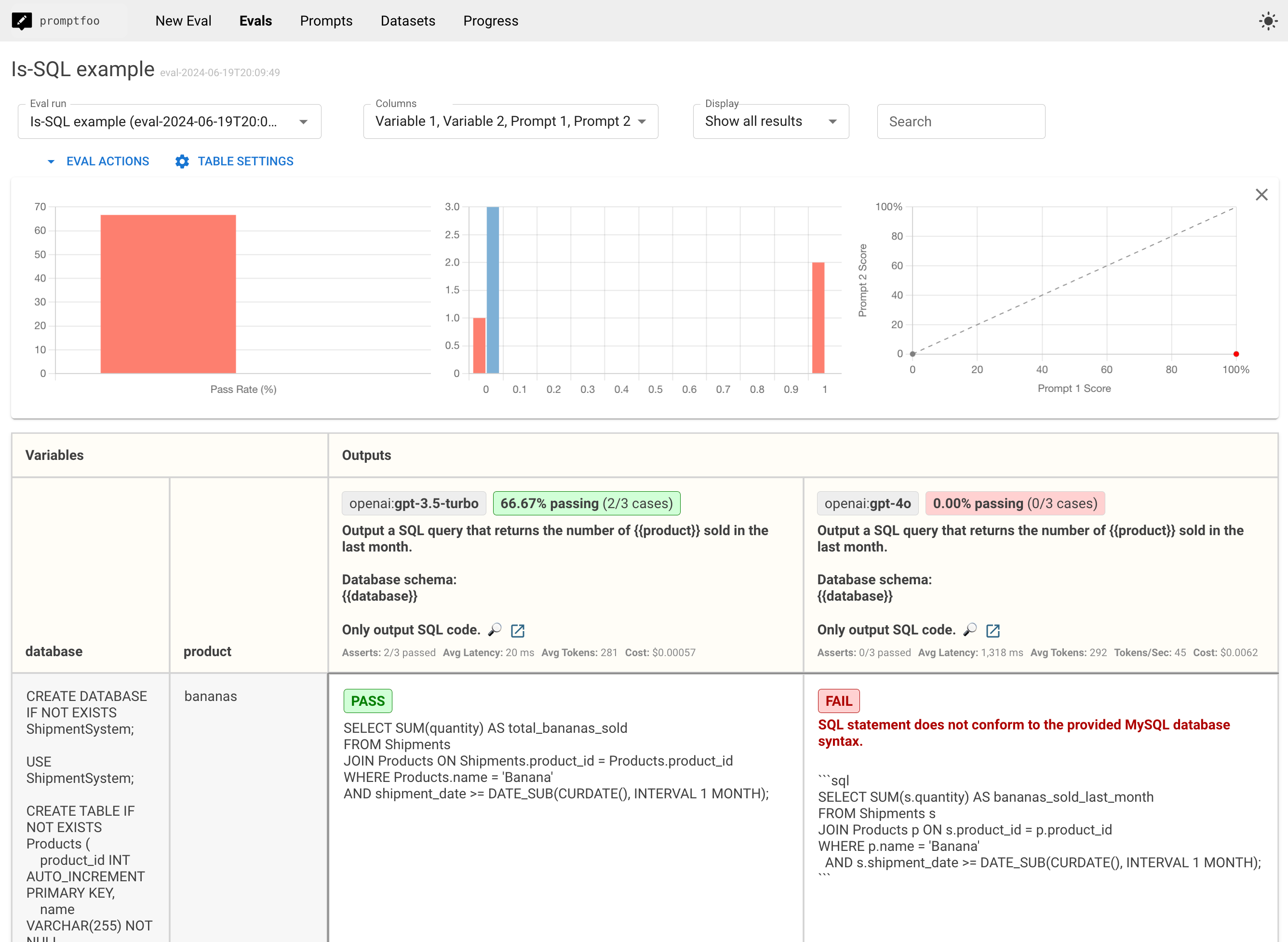Evaluating LLM text-to-SQL performance
Promptfoo is a command-line tool that allows you to test and validate text-to-SQL conversions.
This guide will walk you through setting up an eval harness that will help you improve the quality of your text-to-SQL prompts.
The end result is a view that looks like this:

Configuration
Start by creating a blank promptfooconfig.yaml file (optionally, generate a placeholder using npx promptfoo@latest init).
Step 1: Define the Prompt(s)
Specify the text prompts that will be used to generate the SQL queries. Use {{placeholders}} for variables that will be replaced with actual values during testing.
prompts:
- |
Output a SQL query that returns the number of {{product}} sold in the last month.
Database schema:
{{database}}
Only output SQL code.
If you'd like, you can reference prompts in an external file:
prompts:
- file://path/to/my_prompt.txt
- file://path/to/another_prompt.json
Step 2: Specify the Providers
Define one or more language model providers to use. For example, here we compare the performance between GPT 3.5 and GPT 4:
providers:
- openai:gpt-4o-mini
- openai:gpt-4o
A wide variety of LLM APIs are supported, including local models. See providers for more information.
Step 3: Define the Tests
Create test cases to validate the generated SQL queries. Each test case includes:
- vars: Variables used in the prompt template.
- assert: Assertions to used to validate the output.
Basic SQL Validation
This test checks produces a query for bananas (remember our prompt above) and confirms that the generated output is valid SQL.
- vars:
product: bananas
database: file://database.sql
assert:
- type: is-sql
Use contains-sql instead of is-sql to allow responses that contain text with SQL code blocks.
Table-Specific SQL Validation
This test ensures the SQL query only uses specified tables (Products and Shipments).
- vars:
product: apples
database: file://database.sql
assert:
- type: is-sql
value:
databaseType: 'MySQL'
allowedTables:
- select::null::Products
- select::null::Shipments
The format for allowed notation is {type}::{tableName}::{columnName}, and null can be used to allow any.
Column-Specific SQL Validation
This test is expected to fail since the DoesntExist column is not present in the database:
- vars:
product: oranges
database: file://database.sql
assert:
- type: is-sql
value:
databaseType: 'MySQL'
allowedColumns:
- select::null::DoesntExist
Step 4: Define the Database Schema
Define the structure of your database in a separate SQL file (database.sql).
CREATE DATABASE IF NOT EXISTS ShipmentSystem;
USE ShipmentSystem;
CREATE TABLE IF NOT EXISTS Products (
product_id INT AUTO_INCREMENT PRIMARY KEY,
name VARCHAR(255) NOT NULL,
description TEXT,
price DECIMAL(10, 2) NOT NULL,
created_at TIMESTAMP DEFAULT CURRENT_TIMESTAMP
);
CREATE TABLE IF NOT EXISTS Shipments (
shipment_id INT AUTO_INCREMENT PRIMARY KEY,
product_id INT NOT NULL,
quantity INT NOT NULL,
shipment_date DATE NOT NULL,
status VARCHAR(50) NOT NULL,
created_at TIMESTAMP DEFAULT CURRENT_TIMESTAMP,
FOREIGN KEY (product_id) REFERENCES Products(product_id)
);
CREATE TABLE IF NOT EXISTS ShipmentDetails (
detail_id INT AUTO_INCREMENT PRIMARY KEY,
shipment_id INT NOT NULL,
location VARCHAR(255) NOT NULL,
status VARCHAR(50) NOT NULL,
updated_at TIMESTAMP DEFAULT CURRENT_TIMESTAMP ON UPDATE CURRENT_TIMESTAMP,
FOREIGN KEY (shipment_id) REFERENCES Shipments(shipment_id)
);
Final Configuration
Combine all the steps into a final configuration file (promptfooconfig.yaml):
description: 'Is-SQL example'
prompts:
- |
Output a SQL query that returns the number of {{product}} sold in the last month.
Database schema:
{{database}}
Only output SQL code.
providers:
- openai:gpt-4o-mini
tests:
- vars:
product: bananas
database: file://database.sql
assert:
- type: is-sql
- vars:
product: apples
database: file://database.sql
assert:
- type: is-sql
value:
databaseType: 'MySQL'
allowedTables:
- select::null::Products
- select::null::Shipments
- vars:
product: oranges
database: file://database.sql
assert:
- type: is-sql
value:
databaseType: 'MySQL'
allowedColumns:
- select::null::DoesntExist
Running Tests
Run your tests:
npx promptfoo@latest eval
This will generate a summary of outputs in your terminal.
Review results
Use the web viewer:
npx promptfoo@latest view
This will open your test results and allow you to refine your prompts and compare model performance.
